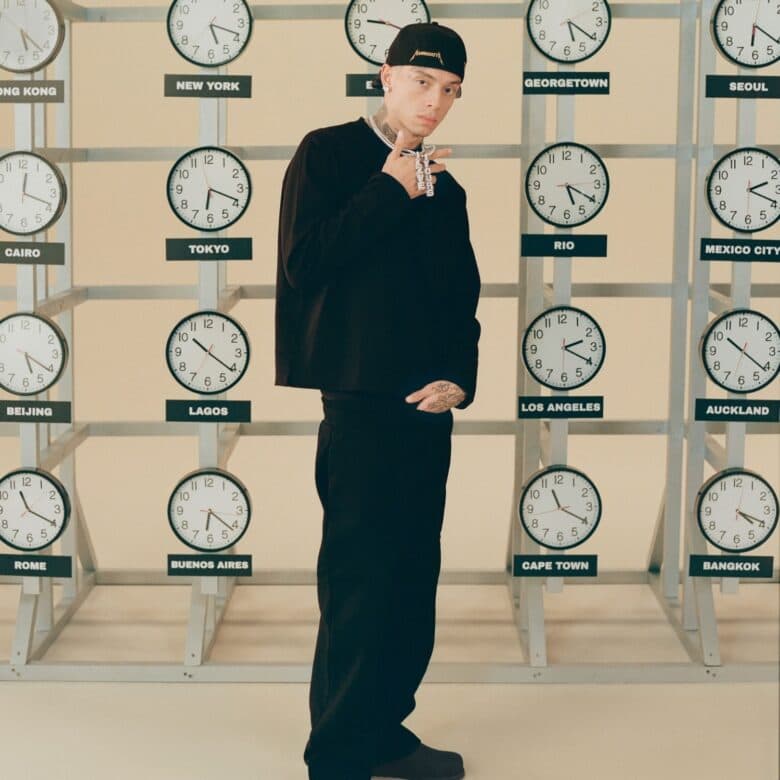“I’m exploring people seeing me in a naked light”: Billie Marten on finding peace in self-acceptance

After ten years of making music, 24-year-old Billie Marten is entering a new era; where she can be truly authentic to herself, and her needs and desires. The folk singer-songwriter is truly an ethereal presence to be around — she’s softly spoken with a tuneful voice that feels like it has been purposefully crafted to sing her delicate songs. On the day of her HUNGER shoot, Marten is a calm presence in the midst of all the hustle and bustle, but even with her gentle demeanour, she exudes a certain vitality ahead of the release of her new studio album, Drop Cherries.
The album’s title is a metaphor in itself, gushing with sweetness and dropping the veil for introspection to take the limelight. At the tender age of 12, Marten – born Isabella Tweddle – began uploading her 70s inspired covers to YouTube from her home in Ripon, Yorkshire. She quickly saw success, and aged 15, dropped her first EP Writing of Blues and Yellows, which was followed by Feeding Seahorses by Hand five years later. Her more recent offering, Flora Fauna, in 2021 debuted a more grown up sound that has matured even more with Drop Cherries.
Being dubbed one of the UK’s most promising indie-folk artists at such a young age has not slowed Marten down, and her work speaks for itself. She is a project within herself: optimistic and ever-changing, but grounded in self-assurance. Here, we sit down with the rising talent ahead of her tour for Drop Cherries…

Hey Billie! You changed your name from Isabella to Billie when you started making music. How did Billie Marten come about?
Billie: It was originally a form of privacy that never really landed because I started when I was young. We needed to mask the reality. And I just liked the name!
How did growing up in North Yorkshire influence your sound? Was there ever a time you felt like you needed to distance yourself from your hometown to pursue music?
Billie: How I started writing was just that. It was down to my environment and my surroundings and I lived quite a small-town life. But obviously, people start talking to you and you have to go out there and see the world. So I live in London now, which was awful for the first few years. I have been here for seven years now and the change from Yorkshire to London was enormous – a huge culture shock.
You’ve been in music for over 10 years now. What was it like entering the industry at the age of 12 on YouTube?
Billie: It was a complete accident. I didn’t really know what was supposed to happen with that YouTube video. I just tried to carry on and finish school. When I saw the big amount of YouTube views, I was just in disbelief. I was running at an average of a hundred views all from my family. So with this one video, it was down to luck.

How did you find your own sound after this?
Billie: It was a lot of emulating other artists I grew up with in my mum and dad’s collection. Mostly the acoustic artists of the seventies.
Is there anyone you love listening to right now, or is on your radar?
Billie: A great artist named Léa Sen. She comes from France, but she lives in South London and she’s supporting me for the next shows. She has this mix between acoustic female vocal backgrounds, but she does all of her own production mixing and arranging and has got this electronic backbone, which is great.
Releasing a full studio album at the age of 23 is such a huge achievement. Do you ever take time to sit back and just soak it all in?
Billie: All the time. I love being in a place of rest and taking things slowly because music is very up and down in troughs. Then you can sit back down and try to make songs again.
How does ‘Drop Cherries’ differ from your other albums?
Billie: ‘Drop Cherries’ is more of a regression in terms of sound. The third album was a classic departure. I think it felt right to do it at the time. This album really comes back to why I started writing the sound that I always wanted to do.
Were there any new sounds that you experimented with in this album?
Billie: Mostly just playing about with live sound and getting in some really amazing players who really knew what they were doing – a horn section was involved.

Can you break down why you chose the title? Did it mean anything to you at the time?
Billie: So the title ‘Drop Cherrie’s came from a story a friend of mine was telling me one night, and I was trying to get into the minds of people that had huge and impactful relationships. He came out with this enormous story, which involves two brothers not being able to be together in the end. But despite that, they had to show each other how much they loved one another. Part of that was stamping red cherries onto the cream carpet from Ikea. I thought it was the most amazing thing I heard. That is when the title was born.
When did you start cultivating ideas for it?
Billie: The story really came at the end, but the origin was, as is always the case with me, making demos and writing and discovering more about yourself really slowly through narrative and forms.
So you recorded a lot of the album in Somerset. Why did you choose this environment?
Billie: I’ve done a lot of albums within the London sphere, and I find that it keeps you impossibly close-minded. You feel like you’re still moving day to day, going back to normal, hanging your normal group, so you need to remove yourself. But my producers and engineers had just built this incredible studio there and it was good timing.
Do you ever take into consideration how followers of your music will track your change or how they’ll interpret it?
Billie: I’ve certainly had some negative comments about the change. I think people will always have their favourite parts of you, with EPs and outdoor stuff. It’s important that it’s me who feels comfortable with what I’m doing.
What do you think you want people to hear from this new album?
Billie: I hope that people would get a sense of strength from within themselves. I don’t want anyone to listen to this album thinking that they’ve lost a bit of identity or they’d rather be another person.

Your new album has bursts of positivity and light throughout. How do you think you manage introspection with the message of staying hopeful?
Billie: Managing introspection and staying hopeful is my daily battle if we’re looking at it plainly. My job is to dissect myself. It’s important not to think too much about how I’ve made music before. It’s always been nitpicking and realising the things that I thought I was doing wrong by poking myself – it just made me feel really small. I think there’s power in identifying the good parts and I think that is what should be made loud.
And if you could urge people to listen to one song, which would that be and why?
Billie: If you’re going to listen to one song, it would probably be ‘Devil Swim’ and the chorus of it is “I wish you’d open your mouth and let the devil swim out.” I’d say this is my ethos or mantra when I was trying to write. It would stop me from going in the negative spiral and it would just keep me on the right track.
Where did the idea to make an accompanying short film come from?
Billie: I love the short film! I think it really aligned itself with my music. I was talking to my director friend Jo Wheatley, who I’ve done loads of videos with, and we felt that the concept of the album fitted in with it being live and together in a communal space with people in the room. The album wouldn’t really have matched with a classic three-minute music video. It also really wouldn’t have had much to do with the songs. I wanted a long-form version because it’s a long-form album that should be listened to wholly. We just sort of cherry-picked different songs and I had all the musicians play the music together.
And how do you approach songwriting and where did your inspiration come from as a whole?
Billie: As a whole, it’s just an ongoing diary entry of my thoughts and feelings at the time. It’s a very present thing. I don’t think when I’m not writing. I’m no good at doing a nine-to-five day so it forces me to write – it just happens.

Have you always been into songwriting?
Billie: Yes. I just started learning other people’s songs when I was seven or eight and then got bored and just wanted to write my own things in my own way.
What things do you do to unwind and get into a creative mindset?
Billie: I do things to relax my mind. Read, garden, take baths, cook, clean – housewife stuff! I’m actually reading Harry Potter for the first time. I’m starting all the way at the beginning and then my plan is to begin watching all the films.
How is tour life treating you?
Billie: Good! So I have just finished touring the UK and US, and then I have some sporadic festivals and then I’ll be doing Europe, UK, and US again.
How is it performing in a room full of people, especially with such an introspective album?
Billie: I’m actually really enjoying it. I love performing when there are necessary vulnerabilities to show. I’m learning to do less acting because art is a performance itself and is encouraged by the natural self. I’m exploring people seeing me in a naked light and it’s making them happy. People like to see you being vulnerable.
In the distant future, where do you see your music taking you?
Billie: Who knows! My journey is to hopefully carry on to make more music and maybe go more into film with some different instruments and collaborations.

